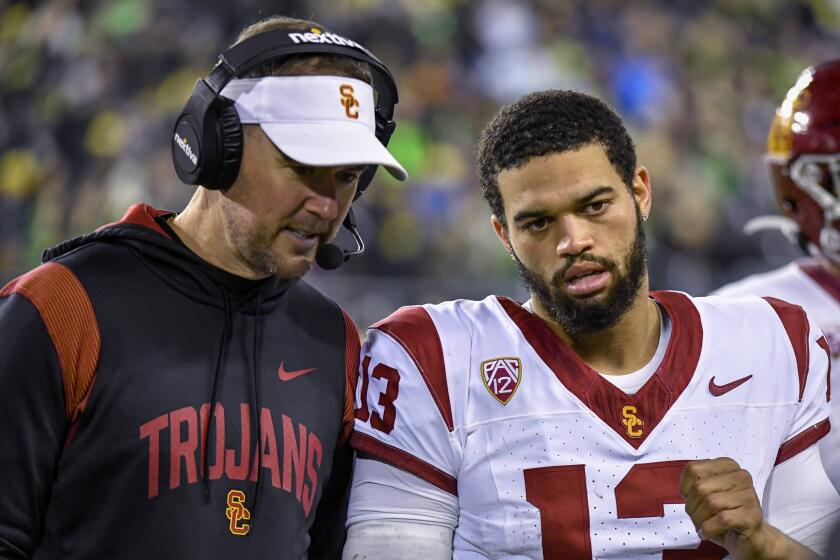‘Baseball War’ for old Asian rivals
In the third inning of the much-ballyhooed “Baseball War” between Japan and South Korea in the championship game of the World Baseball Classic on Monday, cheers erupted at Yagura Ichiban bar in Little Tokyo as Japan scored its first run of the evening.
“We got in! We got in!” Japanese waitress and self-described baseball fanatic Maya Iida exclaimed, punching the air in victory. Other patrons, drinking beer and eating edamame, chattered excitedly that Korean star pitcher Jungkeun Bong -- dubbed “Japan Killer” for his ability to stump Japanese hitters -- was off the mark this night.
But by the bottom of the fifth inning, when Korean batter Shin-Soo Choo evened it up with a home run, the euphoria had transferred to Koreatown. At the neighborhood’s Arang bar, where dozens of fans crowded around several television screens to watch the game that one referred to as a “grudge” match, people stood up and screamed, blew whistles and banged on tables.
“I’m exhilarated because he hit a home run,” said Jeehoon Jung, 33. “I was nervous because the Japanese pitcher was so good. But now I think we’ll win.”
Then in the seventh inning, Japan scored again to take the lead, 2-1.
Adriana Kong, 33, was sitting on the edge of her seat at the bar, her hands clasped together as if she were in prayer. “I feel like I’m out of my mind,” Kong said, speaking in Korean. “I’m too nervous. We’re running out of time. It’s more than a game. I think it’s more of a pride thing. . . . We have to win.”
In the bottom of the ninth inning, South Korea rallied to tie the game at 3-3, forcing the game into extra innings.
And so the nerve-racking, nailbiting evening went for patrons in Little Tokyo and Koreatown as Japan and South Korea faced off in what some saw as far more than a baseball game. Particularly for Koreans, the chance to defeat their onetime colonial masters -- and antagonists in various disputes including unsettled war claims and territorial conflicts -- has fueled frenetic media coverage and public passions.
The rivalry has been front-page news for days in Koreatown and in South Korea. Media outlets have been drumming up excitement, calling the game “The Great Challenge,” “Match of Destiny” and even “Baseball War.”
Back home, star pitcher Jungkeun Bong has been heralded as a national hero. Adding to historic furor, Korean media nicknamed him “Ei-sa Bong Jungkeun,” using an honorific title used for Korean independence activists during the Japanese colonial period. Bong has the same first name as Ahn Jung-geun, a nationalist who assassinated Ito Hirobumi, a onetime Japanese prime minister and head of the colonial government in Korea.
“We can’t forget the past,” said Arang bar patron Sean Park, 35, who was accompanied by half a dozen friends waving miniature Korean flags. “It’s sensitive because [the two countries are] right next to each other. We absolutely have to win.”
The games have been big news in Japan as well, drawing viewership ratings of 30% and higher. Tatsuhito Iida, Los Angeles bureau chief of the Yomiuri Shimbun, Japan’s largest daily newspaper, said some Japanese would agonize over losing to Korea because of historical rivalries.
“Many people feel they can’t lose to Korea especially because historically [Koreans] don’t have good feelings toward Japan and will try to beat us,” he said.
But overall, far less overt emotion over any bilateral rivalry was evident in Little Tokyo than Koreatown.
At Mitsuru Sushi and Grill on 1st Street in Little Tokyo, owner Mamoru Hanamure said younger Japanese like himself born after World War II do not inject historical issues into their baseball passions as much as Koreans.
“We younger people don’t really care about them because we had nothing to do with the war,” he said.
Hiroshi Furusawa, consul with the Japanese Consulate in Los Angeles, said people made too much of the historical rivalry.
“We’re just playing baseball,” Furusawa said. “They have a very good team and so do we.”
Many Japanese said they were glued to the tube not so much to see Japan defeat Korea but for the rare chance to see all of their nation’s baseball superstars -- including five U.S. major league players -- on one dream team.
At the Miyako Hotel in Little Tokyo, Yutaka Yamagishi said about 75 to 90 guests had flown in from Japan just for the games and tour packages were advertising tickets as high as $850 for Monday’s championship game.They got their money’s worth. In the 10th inning, Japan scored two more runs against its archrival, making it 5-3. The South Korean team failed to come back.
“People were cheering and clapping and buying each other drinks,” said Masa Teranishi, manager of the Little Tokyo bar. “It was very, very exciting.”
--
victoria.kim@latimes.com
Times staff writer John Glionna, reporting from Korea, contributed to this report.
More to Read
Go beyond the scoreboard
Get the latest on L.A.'s teams in the daily Sports Report newsletter.
You may occasionally receive promotional content from the Los Angeles Times.












